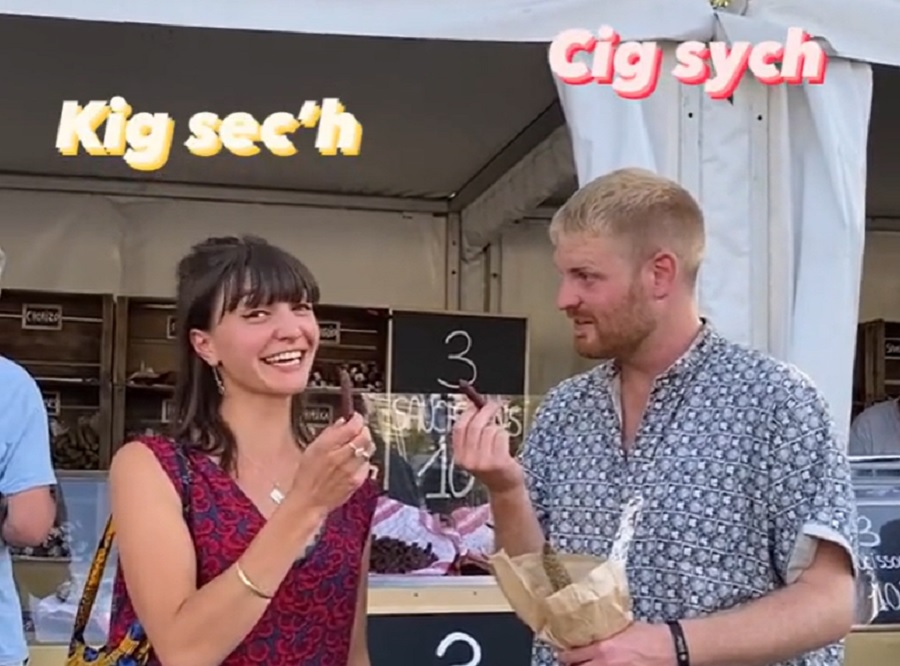Watch: Amazing TikTok video goes viral after showing the similarities between Welsh and Breton

Welsh and Breton look very different on the page but a remarkable TikTok video that has gone viral shows that there are many similarities between them.
Despite one language being spoken in France and the other within the UK, both are closely related having only gone their separate ways in the middle ages, and in the video Azenor Kallag and Gwilym Bowen Rhys demonstrate how much they have in common with a string of common phrases.
Along with Cornish, Welsh and Breton make up the Brythonic branch of the Celtic languages, with the former having since they split borrowed many words from English and the latter from French. However many older words and numbers remain similar.
@lwps4c Dysgu ‘chydig o Lydaweg yn Lorient Interceltique Festival, gyda Gwilym & Azenor 🌍 #breton #welsh #cymraeg #llydaweg #lorient #interceltiquefestival #languages ♬ original sound – Lŵp
Despite being separate branches of the Celtic language tree, Irish, Scots Gaelic and Manx, meanwhile, are Gaelic languages and don’t retain the same level of mutual intelligibility as Welsh, Breton and Cornish.
In the video, filmed at the Lorient Interceltique Festival in Brittany, Azenor Kallag and Gwilym Bowen Rhys list a number of words and phrases including “the dog is looking at the fish in the sea” and “let’s go for a walk on the bridge”.
The video impressed subscribers to the channel, with one, Gwawr Darling, saying: “That’s extremely interesting. I hadn’t realised so many words sounded so similar.”
Molly added that “you can hear the influence of French on Breton”.
Gari Bracla added: “I’ve never felt so sophisticated!”
Support our Nation today
For the price of a cup of coffee a month you can help us create an independent, not-for-profit, national news service for the people of Wales, by the people of Wales.






Baragouine became the French for ‘Double Dutch’ when Breton soldiers were billeted in mediaeval Paris, saw white bread for the first time and exclaimed ‘Bara gwyn!’ (‘White Bread’ in Breton / Welsh). Their language was incomprehensible to the Parisians, Breton and Welsh being similar. So ‘baragouine’ in French came to mean gabble or babble.
Excellent stuff.
Great vid….I’m a massive fan of just about everything Gwilym has ever done! Fantastic musician!!!
Dw i’n hefyd!
She’s very cute!
Nana used to speak Welsh to Breton Sioni Winwns who spoke Breton back. They were quite comfortable chatting away together over a cuppa and a haggle. The “Johnnies” had a house in Cardiff they stayed in while stringing the onions before setting off with pushbikes so festooned in strings you couldn’t see the bike.
My Nain was brought up in Porthmadog in the 1890s and told me that she could understand Soni Winwns speaking Breton. I don’t think she did – I think that what she thought was Breton was Sioni’s attempt at speaking Welsh. If a Welsh-speaker tries to learn Breton it is very easy, because ot the great similarities in syntax and lexicon (similarly Cornish), but these similarities ar grossly exaggerated – spoken Welsh and Breton are no more mutually intelligible than English and German, or English and French. I reckon that your Nana made the same mistake as my Nana. Os… Read more »
Dwi’n cofio siarad efo hen Lydawr roedd o wedi rhyfelu yn ystod yr Ail Ryfel Byd, mewn cyfnod roedd o wedi cyfarfod efo Cymry, a fo yn dweud: “mae’r Saeson yn siarad Llydaweg!”, a fi yn gofyn iddo os oedd o’n gallu deallt nhw. “Siwr, bara, gwin, dour, merc’hed…”
Ond peidiwch a dweud ‘gwin coch’ syth yn meddwl ‘gwin c***u’ yn Llydaweg… Gwin ruz dan ni’n dweud.
Pryd aeth “Gwin rudd” yn “win coch”?
Tydwi ddim yn gwybod. Ydi’r gair ‘coch’ yn dod o’r Gwyddeleg? Mi glyfais I ddweud bod y gair ‘clust’ yn dod o’r gwyddeleg. ‘Sgwarn’ (sgwarnog) ydi’r gair gwteiddiol, skouarn yn Llydaweg. Skouarneg ydi rhywun efo clustiau mawr…
Gair benthyg o’r Lladin yw ‘coch’.
This reminds me of an episode of Poldark where Demelza sang a lullaby in Cornish. My Cymraeg is not good, but I understood 90% of what she sang.
Great video. But why the surprise Cymraeg is similar to Breton (Briton) seeing it’s the mother tongue of those who live in Brittany (little Britain) that fled Saxon invasion of Southern Britain to the Gaulish territory once called Armonica. now Brittany in modern day Northern France. They are us and we them. Cymry.